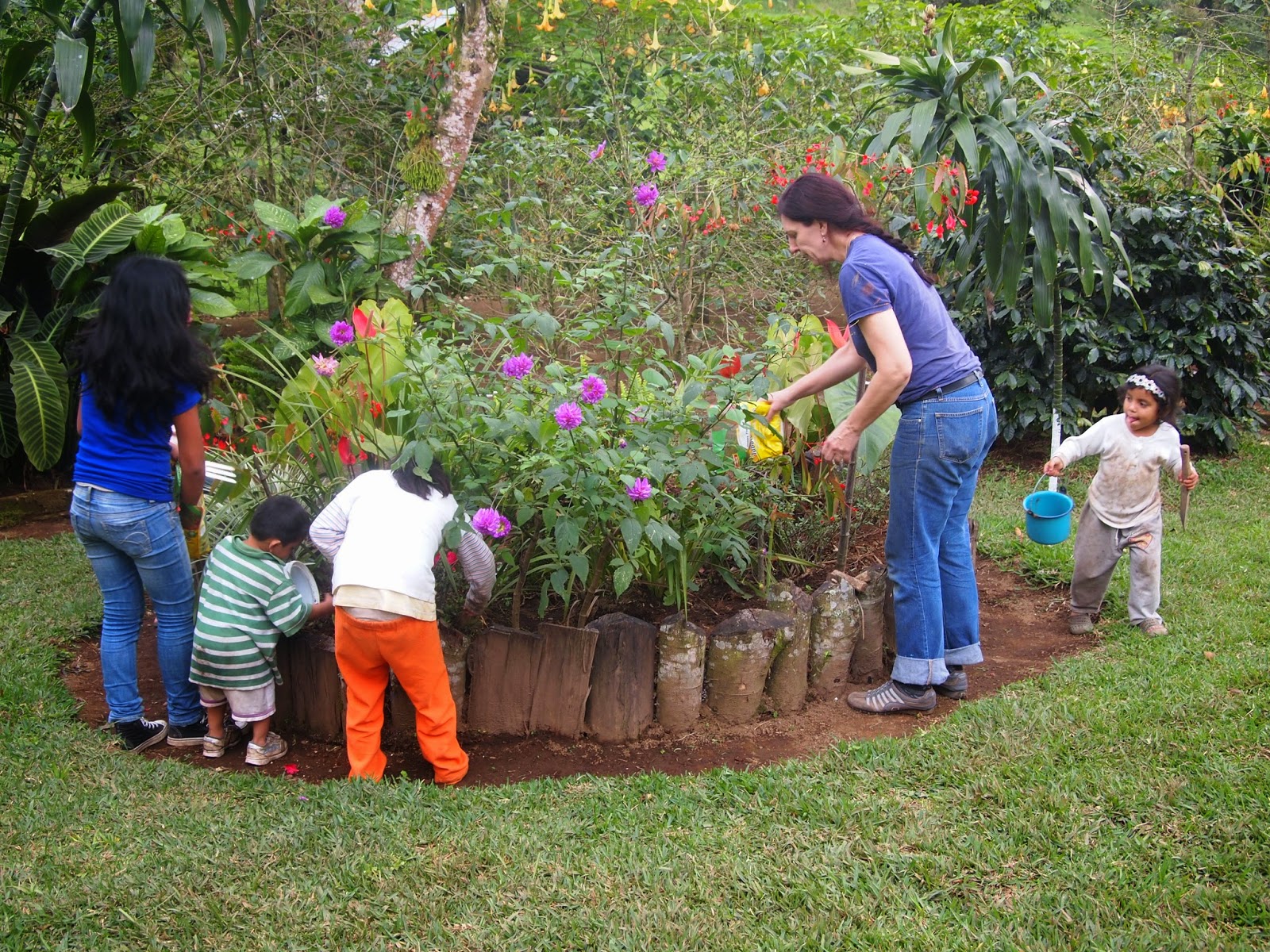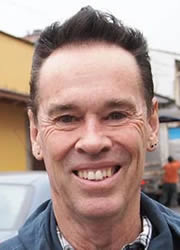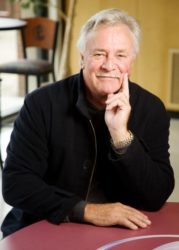Photo – The family gardening in Coatepec
Michael: How did moving to México play out in terms of your trajectory of ‘accidental’ academic life?
Colin: The die for the next two decades of research and publishing had mostly already been cast in Australia. We continued to research and publish along two main lines: ‘New’ literacies (our sociocultural take on literacy and new technologies) and qualitative research as teacher research. To explain this some backtracking is necessary.
Our initial interest in literacy and new technologies came about because Michele had always been interested in computing, had a fledgling knowing of programming from her high school days, and a favourite cousin of hers was a computer science student at the university we worked at. A good two years before staff got home access to the internet through the university, he gave us a program that got us online at home. And, as you may remember, Michael, when you came and visited us we got onto Lynx at our house. We read about Mosaic and wrote to the US for a copy. But by the time the CD arrived from the US the first version of Netscape had just been released.
So, we were online at home with unlimited access at the literal beginning of the graphic browser. We knew this was where things were going — where literacies were going to be forged … apace. We felt this was the next big thing for literacy research, and we already had the conception of literacy as literacies — so many social practices and conceptions of reading and writing — that I had run with in Literacy, Schooling and Revolution. And we just said “OK, here we go. What’s happening with literacies on the internet?”
It was as simple as that. We followed the trade books literature– Rheingold, Rushkoff, Bennahum, Steven Johnson etc — and witnessed the first punk ezines at close quarters. We ran with the cyberpunk literature, the hacker crackdown, When Wizards Stay up Late, all that stuff, and we crunched it through a New Literacy Studies lens. And we started looking in fairly systematic ways at the differences between what was going on with computers in classrooms and what was going on with computers in bedrooms. A prospective doctoral student introduced us to Michael Doneman in Brisbane. Michael had established a space in a warehouse in a then gritty part of the city centre that mixed performance art with state of the art digital technologies infrastructure, and entrepreneurship. Young people came in and explored how they might be able to use computers and the internet to build some economic life around their passions. I could devote thousands of words simply to unpacking Michael’s (and Ludmila’s) genius. Suffice to say that Michael was working twenty years ahead of the entrepreneurial curve in terms of internet mediation and he introduced us to the work of cyberpunk e-ziners and young indigenous people seeking ways to parlay their heritage into entrepreneurial possibilities. That informed much of our literacy research agenda, and we went for it because I guess we both had incipient hacktivist sympathies …. and we were in solidarity with such kids.
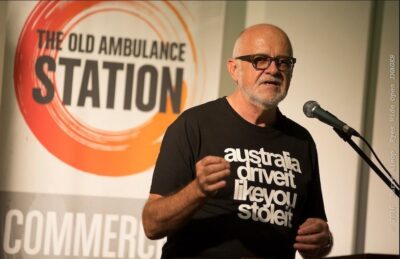
Michael Doneman
Michael: And that was outside of academe?
Colin: Well, academe was mediating our online access at home via dial up, and we employed Michael in consulting and design roles in the Digital Rhetorics project. This is the link to the massive role that Chris Bigum’s friendship and collegiality has played in my academic life to this day. More serendipity. Chris was visiting QUT at the time the call for proposals for the national competitive grant for what became Digital Rhetorics was advertised. We knew each other’s work but had never met. Chris suggested we meet to talk about making a bid. I think he felt some digital cultural kinship, and we put together a successful bid — starting that very day on a whiteboard. Chris had been ‘in computing’ since punch cards, but his relationship to digital technologies seemed primarily cultural to me, and grounded in ‘chasing the interesting.’ He was a consummate internet insider and we talked and, I think, bonded around stuff that had a kind of common denominator in the kinds of spaces Micheal Doneman was playing in, as well as in John Perry Barlow’s original distinction between ‘natives’ and ‘immigrants’ to cyberspace.
The conversation continued when Digital Rhetorics was done. Chris took up a research leadership and mentoring role at Central Queensland University and, with his partner, Leonie Rowan, we just continued talking and meeting. Chris threw all kinds of resources at us, and we picked and chose gems like Michael Schrage’s idea that digital technologies were most significantly relationship technologies. And massive amounts more. We worked together on a book, did a conference keynote, and in the time ahead of our leaving for México, Chris got us ‘adjuncted’ at CQU, and tagged some money for us to earn by doing distance research supervision when we got to México. That was the earning we were able to provide evidence of to our immigration lawyer. The apostilled documents we got from CQU got us temporary residence. Chris and Leonie got us earning online, and we were on our way.
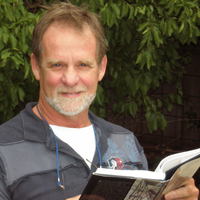
Chris Bigum
Peter McLaren had mentioned me to his UNAM colleagues Alicia de Alba and Edgar González Gaudiano in the mid 1990s, and Alicia got us both to México City to do keynotes not long before Michele and I moved there. They met us at the airport, found us an apartment to rent, settled us in, and Alicia linked me to the UNAM through a fellowship. This got us around a lot of México and opened up many relationships to Mexican academics and publishers. And you and I, Michael, wrote a book with them on Education in the Postmodern Condition. It’s a small world.
Against that background we took up where we left off in Australia, surviving economically by doing research supervision work at distance via the internet. Work from the Digital Rhetorics project became a book with Ilana Snyder, Teachers and Technoliteracies, which ran to a Japanese edition. And Michele and I produced the work that yielded the first edition of our New Literacies books. We teamed up with Ivor Goodson and Marshall Mangan to publish Cyber Spaces/Social Spaces: Culture Clash in Computerized classrooms. And running alongside the literacies and technologies work we continued publishing qualitative research methods books together — including with Mexican university presses. And our publishing branched out — including at different periods with you, Michael — into editing a book series and a journal. And, of course, you and I published a number of books together with Mexican, US, and New Zealand colleagues on critical theory and aspects of the postmodern condition. The book series Michele and I edited for Chris Myers (https://myersedpress.presswarehouse.com/) when he was at Peter Lang publishing gave Michele and me a welcome opportunity to ‘pay on’ what Ivor Goodson and Malcolm Clarkson (at Falmer Press) had done for me: hunting down early career researchers and asking if they’d like to do a book.
But mainly it has been ‘new’ literacies, digital literacies, DIY media, cultural practices of digital remix, the study of internet memes, researching new literacies.
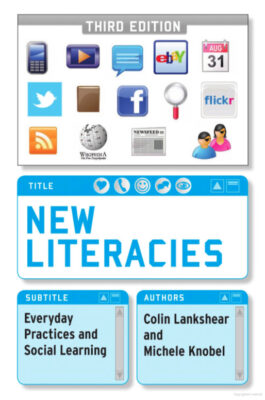 Michele and I have not infrequently been identified as apologists for, and even fans of, new technologies, the internet, whatever. We don’t see it that way, and we certainly don’t feel it that way. So far as is possible, we eschewed ideological siding from the time we first began working together. We tried, to the best of our abilities, to describe and explain what we saw going on. For sure, we observed and documented the discrepancies between in-school practices and social practices in wider contexts. To the best of my knowledge, we have never ever said “school learning should – let alone must – be mediated by digital electronic technologies and networks.” We have, however, consistently assumed that if formal education does seek to integrate new technologies into learning routines, then it should be done in ways that exploit effectively what the technologies may have to offer: a theme we pursued from the very first conversations with Chris Bigum.
Michele and I have not infrequently been identified as apologists for, and even fans of, new technologies, the internet, whatever. We don’t see it that way, and we certainly don’t feel it that way. So far as is possible, we eschewed ideological siding from the time we first began working together. We tried, to the best of our abilities, to describe and explain what we saw going on. For sure, we observed and documented the discrepancies between in-school practices and social practices in wider contexts. To the best of my knowledge, we have never ever said “school learning should – let alone must – be mediated by digital electronic technologies and networks.” We have, however, consistently assumed that if formal education does seek to integrate new technologies into learning routines, then it should be done in ways that exploit effectively what the technologies may have to offer: a theme we pursued from the very first conversations with Chris Bigum.
Whatever enthusiasm our works may reflect for people doing things with new technologies is mainly a consequence of the enjoyment we have derived from researching what we see as ‘authentic’ and ‘fun’ aspects of people’s lives. Where people are enjoying themselves we have tried to convey that. When young people exude passion for their digital pursuits and the learning and competence they acquire and celebrate we try to communicate that — usually with the message that if schools want to enhance engagement in classroom learning then there are plenty of clues to be had from the cases we describe.
Michael: I associate Michele’s work mostly with Montclair State University, USA and not with México.
Colin: Michele found it increasingly difficult to live well without a full time academic job. Since 2003 she has found a warm, welcoming, and admirably collegial home at Montclair State University. She has found the happiness in a university job and career that I would have loved to have been able to find myself. Our collaborative work has continued at the same rate and the same intensity as previously. As a permanent Mexican resident I have found part time gig work with universities in Australia and Canada on terms that I have managed and found rewarding. The university has always treated me well, and for that I am grateful.
However, during the past 15 years, as an Adjunct Professor at a small Canadian university, I have found a contract-by-contract teaching home within a Masters of Education in Literacy program that has to a wildly impressive extent resisted performativity and maintained an unstinting commitment to the ideals of collaborative learning, maximum learner-directiveness, minimal competition (pass/fail on a learning team basis), and an emphasis on learning in dialogue with peers. The program, developed by Andy Manning, has optimised our opportunities to integrate new technologies into learning in ways that simultaneously enhance learning opportunities and maximise the potential of new tools and networks for learning purposes. It has been a gift, and it has kept me in the game, at least (very) part time.

Andy Manning
Michael: So yours is not so much a critique of the neoliberal university as of an institution too structured and irrelevant to the real problems of living?
Colin: It’s a bit of both, plus my own complications of akrasia and poor prioritising and time management. The fact is that for much of my time in Auckland I could find ways to address ‘the real problems of living’ as I saw them: in teaching, in writing, and in resourcing small scale projects. But the neoliberal squeeze and the transition of Schools of Education to Teacher Education Faculties in Australasia pretty much doomed that. Becoming a Quantum Serf meant working 90+ hour weeks just to be able to do some of the things I wanted to do as expressions of academic authenticity. And the akrasia meant that I did not turn down invitations for things — keynotes in interesting places, book publishing opportunities — that diverted my attention away from things I still believed somewhere inside that I should really be doing and being. I couldn’t strike a balance, and I experienced a lot of frustration, conflict and self-loathing. Michele’s ‘call to quit’ worked for us both.
Michael: There is considerable romance in this model of an activist, a rebel, a man of the people, intimately committed to people of the land – but also a Marxist theory of revolution, especially in the context of South America. I say romance because it is a political ideal of the engaged organic intellectual. I’m not so much interested in the scholarly debates over Gramsci and Guevara as what it has meant for your life working and writing and teaching.
Colin: Yes, a lot of romance, and the photos in previous segments speak graphically to that.
Michael: I guess Michele shared these fundamental values?
Colin: Yes, but in her particular way. I see Michele’s values more as Christian/Lutheran, “good human being values”: Michele has good/sound “habits of the heart” (Robert Bellah). I think this is what I grasped intuitively on first meeting her. For me Michele is primarily defined by her applied ethics. She supports good causes by donating generously and often, and is an avid supporter of young people’s entrepreneurship. Her solidarity is intense but ‘quiet’ — valorising people with positive feedback, passing along, and getting alongside issues and causes where she can.
Educationally, she believes passionately that children are ripped off and stupidified by pretty much all the formal schooling she knows of, and that young people’s serious literacy investments are best looked for and understood by investigating what they do in their everyday lives. That’s what has driven her in our collaborative work on literacy. She exudes moral outrage at stupidification on a scale equal to her disgust at how she sees societies like the US treating their poor, their people of colour, and certain categories of immigrants. Her solidarity is expressed locally, quietly and effectively.
I know that as a beneficiary, from when she started helping me put together “quantum” in Australia. She put out so much unpaid, freely given, labour and support to help the research concentration I was directing look as good as it could look. That’s where our academic ‘togetherness’ really got going — she was simply going to help us get that research concentration as quantum-robust as we could get it. In working together to build a respectable looking research concentration output we built a strong and enduring research and writing collaboration. We were joined at the keyboard as well as the hip.
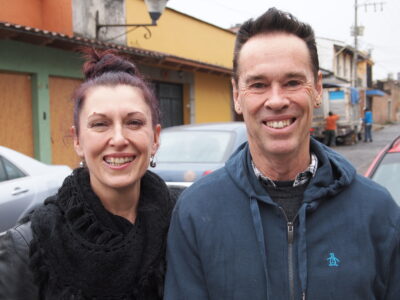
Michele & Colin in Coatapec
Michael: Albeit for almost 20 years somewhat “at distance.”
Colin: Albeit with one major exception; one that is absolutely of the essence for me. We had bought a small patch of coffee land near our house and decided to keep it as coffee land and make our own coffee. A peasant family moved onto a nearby patch of land and built exactly the kind of dwelling I had seen so much of in Nicaragua: branches, tyres, polythene, scrap iron. One day the husband came and introduced himself and asked if we had any work he could do. We said we didn’t really, but would think about it. The history in this is the grief I felt at losing connection with the folk in Monte Fresco. I was through with starting stuff and leaving. We talked, and knew that if we got involved it would have to be a long term commitment. Fifteen years and numerous children later it still is. We committed to the equivalent of paying for 7 working days per month at considerably better than the local average daily rate for agricultural labourers. In effect, almost enough to survive on.
We talked through what would work for us while working for the family. That extended to them growing bananas, using some land for a vegetable garden, and exercising their own creativity to create a beautiful space.
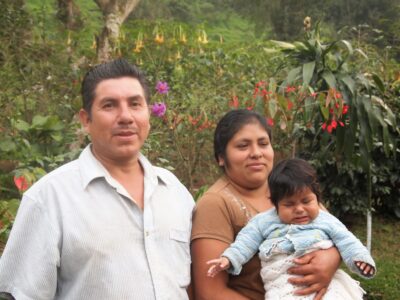
David & Cecelia Family Coatapec
The partnership has grown into a beautiful thing that gives me everything and more that I immersed myself in whilst in Nicaragua. David and Cecelia and their family have grounded our Mexican lives as deeply as anyone and anything can. They have been my primary ‘enculturators’. Friends for life, makers of powerful meanings, and sharers of unconditional trust. Michele spends as much time in México as she can, and has been exploring the ways a mobile phone is incorporated into David and Cecelia’s domestic and family life. Meanwhile, I have begun digitising all the material from my sabbatical experiences at the end of the 80s, with a view to writing about it in ways that I have not to date.
Michael: What is your view on literacy now, from a theoretical perspective? In what ways do digital technologies transform us and literacy studies?
Colin: I don’t think our basic theoretical approach to literacy has changed. We still understand literacy socioculturally, as socially recognised ways in which people (as discursive subjects) express, distribute, negotiate and refine meanings through the medium of encoded texts in the course of pursuing tasks and purposes in the world. The thing we have most tried to contribute to is understanding crucial trends in literacy practices that are mediated by electronic technologies and networks: things that, for us, make certain kinds of literacy practices ‘new’ in a significant sense.
Based on our reading, online practices, and conversations with folk like Chris Bigum and Michael Doneman, we identified a set of constructs during 1999-2002 that we used to characterise ‘new’ literacies. These included Jeff Bezos’ concept of second phase automation; the institution of online ratings; Michael Goldhaber’s idea of an attention economy comprising stars and fans; Michael Schrage’s idea that, more than information and communication technologies, the new technologies are fundamentally relationship technologies; and the internet’s appropriation of the idea of memes as strategic practices of enacting cultural virality.
With the advent of powerful electronic networks and social media platforms these have played out quite remarkably, and continue to do so. Adopting second phase automation as his key operating principle, and incorporating ratings and reviews into his core business interface, made Jeff Bezos not only the world’s richest man, but the #1 go-to source for consumer and urgent items in the midst of the Covid crisis. When our set of constructs come together in the fact of social media throwing up phenomena like Pewdiepie, practices of “mainstreaming” thinly disguised forms of racism, spreading hate memes, trolling ‘for the lulz,’ or to foment social division, manipulate elections, or even to engage in covert cyberwar, we have every reason to be concerned; and every reason to try and understand these phenomena as best we can.
Our current work has returned to researching memes, but the further we go with this the more we see the need for research that links the study of socially dysfunctional literacy practices to such things as understanding the social psychology of disaffection and hatred (René Girard and colleagues), the current attractions of tribalism and intensified suspicion and fear of the ‘Other,’ and the like. It is deeply ironic that we presently find the world mobilising at great cost and inconvenience to battle a biological virus that kills human bodies, yet simultaneously witness powerful figures in government at least tacitly endorsing cultural viruses that destroy souls. One of the most important stories of our time is how literacy practices playing out in social media fomented and galvanised the meteroic rise of the alt-right. As always, of course, it is one thing to have theories and knowledge informed by those theories, and another thing altogether to be able to galvanise civic activism to bring progressive ideals into effect.
A lot of it feels like déjà vu all over again.
We are currently exploring what we see as a serious limitation in the academic study of internet memes. When Richard Dawkins introduced his concept of memes it was largely with a moral intent related to understanding how, as cultural beings, humans could choose to overwrite their genetic predisposition toward ‘selfishness’ in the biological sense Dawkins spells out. The point of understanding memes as ‘cultural evolution’, by analogical extension of genes and genetic behaviour, is to understand how we might use our metalevel capacities to ‘conspire’ in the interests of a long(er) term good of all, rather than privileging our own immediate survival value and, optimally, to actively pursue altruism in the sense of privileging the immediate survival value of others over one’s own. If we think about the kinds of moronic behaviours we have witnessed recently — like hoarding toilet paper and emptying food shelves in supermarkets — we can get the idea. But all this was lost from the get-go in practices of participating in internet memes and researching such participation. The current moment suggests to us the value of getting back to where Dawkins was coming from and relating that to current participation in memes. And that is where our current academic research and writing is at (e.g., https://doi.org/10.18848/2470-9247/CGP/v04i04/43-57)
Michael: Your mention of ‘social digitalism’ and how it has aided the alt-right — which is so deeply anti everything and everybody not white and male — resonates with one of my current interests: namely, how it is also partly responsible for the current growth of conspiracy thinking. Now, more than any time in the past, that is a form of conspiracy thinking that is anti – government, anti- science, anti-technology, anti – intellectual or anti-expert. I’m intrigued that there are people with no background in math or epidemiology who can confidently contradict expert prediction and also assert that Covid-19 is caused by 5G! There is also willful misleading information — disinformation — that is circulated and automatically generated for political gain. How can critical literacy deal with this welter of garbage, lies and misinformation?
Colin: Well, in the ways it has typically been written about, critical literacy can hardly touch any of this, which is why Michele and I scarcely mention it these days. Commitment to tribes and affinities, and to ‘the lulz’ has nothing whatsoever to do with concern for truth. It’s all about who and what folk identify with, and often with little concern for being reasonable. Given the scale of current contingencies I don’t actually believe any pedagogy can seriously touch this other than in tandem with a ‘prime mover’ that shakes a majority of people into serious and urgent concern for the habits of the heart. The nearest things we can see to pedagogical approaches that might get at least a little traction are initiatives like
(i) Non-Compete’s Pewdiepipeline or
(ii) Innuendo Studios’ Alt-Right Playbook or
(iii) Destiny’s (Steven Bonnell) online debating shows
Michael: Finally, can I get you to reflect on how you see the form/genre of this series of interactions?
Colin: I’m hoping it is more than an academic picaresque, but what I hoped it would be might not be how it has turned out. There is obviously some post hoc sense-making of a kind of academic life by an aging man, and some lapses into rationalisation and confessional. But what I have tried to do is take the opportunity to create a kind of (very incomplete) Academic Autobiographical Bibliography that identifies, acknowledges, and celebrates the people (‘community’) who have been crucial to my becoming who and what I am academically — for better or for worse. These are people who could claim the ‘existential property rights’ to my ‘academic being’: even though they may well not want to. They are the references and the resources I have drawn on as I have gone along, following my ‘line of argument.’ Hence, they are like the References, not the Acknowledgments, as I see things.
I also think of it also as a kind of Humbling genre because, having written it through — lamenting the many omissions that could not be accommodated — my overwhelming feeling is of not deserving what folk have freely given me. It has been sheer ‘fortune.’ Without all you folk I could not have had my academic life; and I have found it impossible to forge a life — academic and otherwise — that does anything like justice to you all, and to your being there when you were. Then again, what could possibly reciprocate all that? And I wonder if getting down to reflecting on our fortune and articulating our ‘humblings’ might be a kind of writing that could help see us through this challenging present moment of human history. I know that I deeply appreciate having had the chance to write this: to subvert what set out as an interview and, instead, to name and own academic riches that have come my way.
Thank you.



